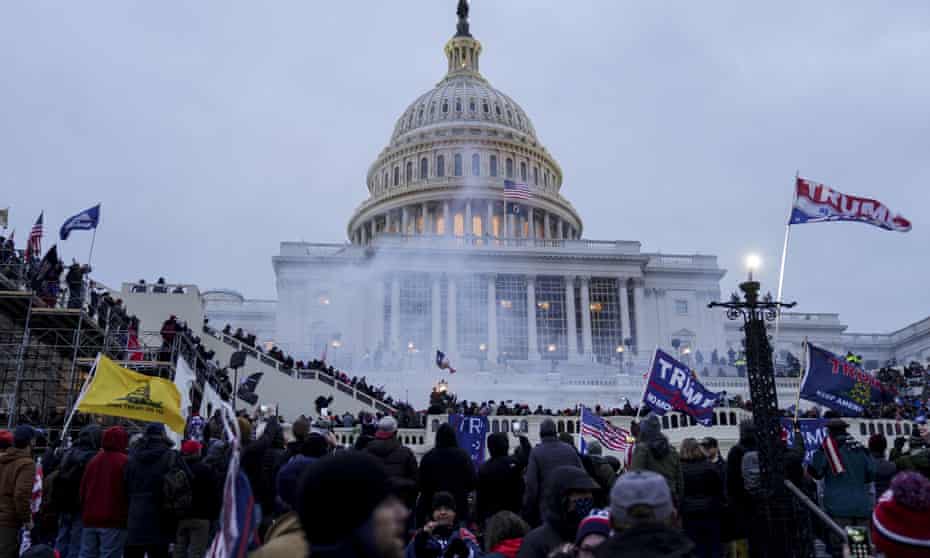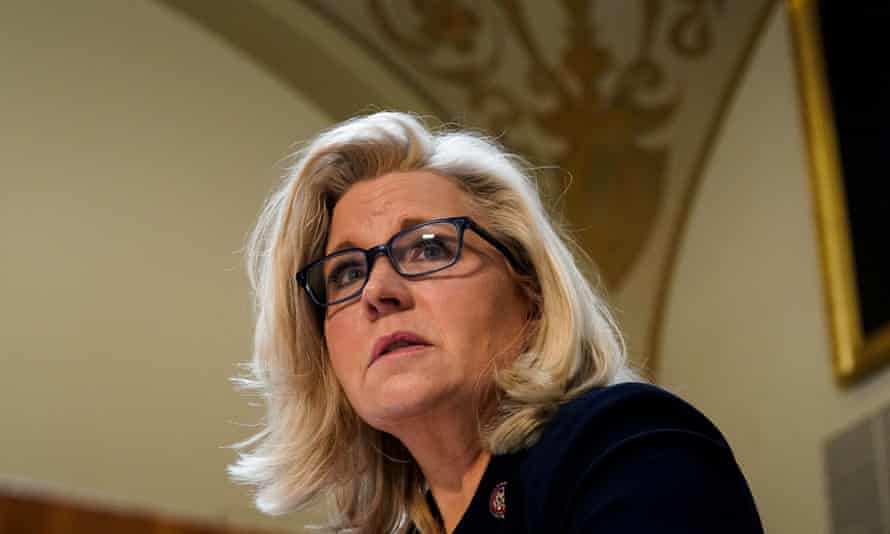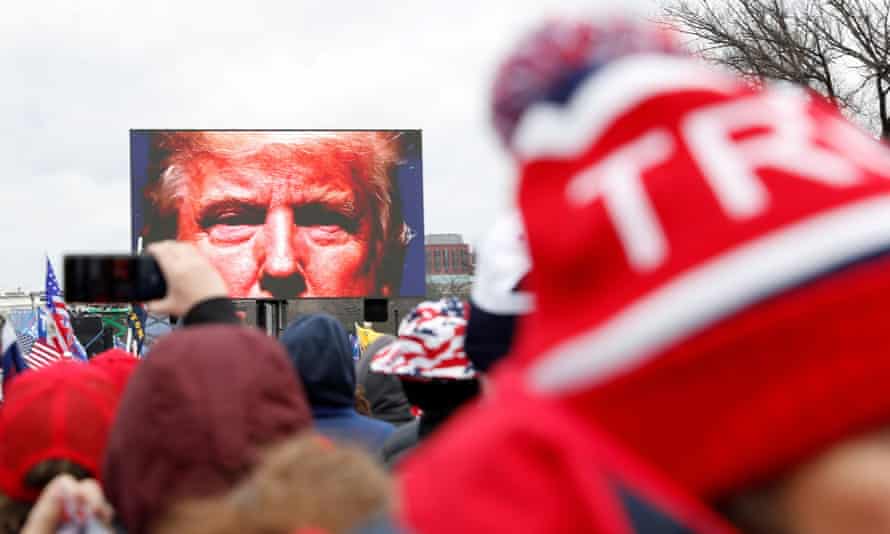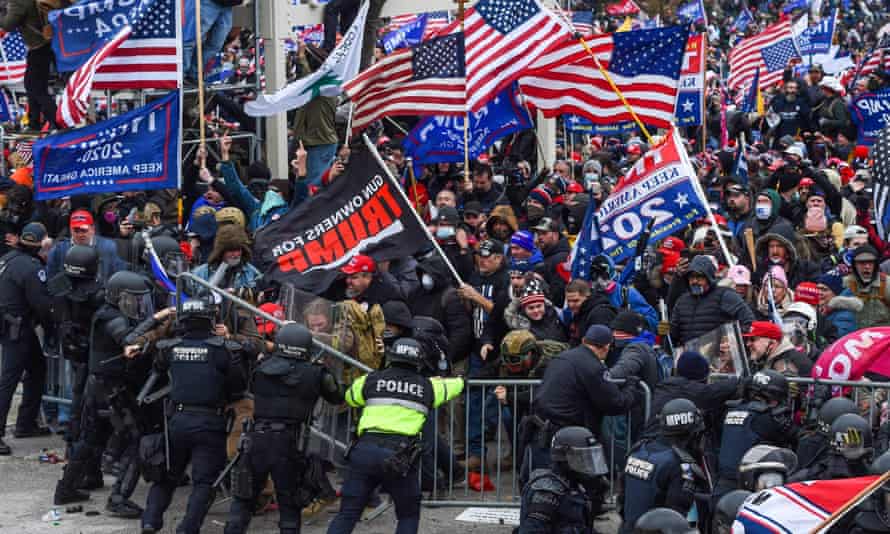Trump could face charges for trying to obstruct certification of election, legal experts say
"Analysis: charges could be well founded given Trump’s incendiary remarks to a rally before the Capitol attack and aggressive pressuring of officials

Expectation is growing that Donald Trump might face charges for trying to obstruct Congress from certifying Joe Biden’s election this year as a House panel collects more evidence into the 6 January attack on the Capitol, former prosecutors and other experts say.
Speculation about possible charges against the former US president has been heightened by a recent rhetorical bombshell from Republican representative and 6 January panel vice-chair Liz Cheney suggesting the House panel is looking at whether Trump broke a law that bars obstruction of “official proceedings”.
Former prosecutors say if the panel finds new evidence about Trump’s role interfering with Congress’ job to certify Biden’s election, that could help buttress a potential case by the Department of Justice.
In varying ways, Cheney’s comments have been echoed by two other members of the House select committee, Republican Adam Kinzinger and Democrat Jamie Raskin, spurring talk of how an obstruction statute could apply to Trump, which would entail the panel making a criminal referral of evidence for the justice department to investigate, say DoJ veterans.

Cheney’s remarks raising the specter of criminal charges against Trump came twice earlier this month at hearings of the committee. Experts believe the charges could be well founded given Trump’s actions on 6 January, including incendiary remarks to a rally before the Capitol attack and failure to act for hours to stop the riot, say former justice department officials.
“Based on what is already in the public domain, there is powerful evidence that numerous people, in and out of government, attempted to obstruct – and did obstruct, at least for a while – an official proceeding – i.e., the certification of the Presidential election,” said former DOJ inspector general and former prosecutor Michael Bromwich in a statement to the Guardian. “That is a crime.”
Although a House panel referral of obstruction by Trump would not force DOJ to open a criminal case against him, it could help provide more evidence for one, and build pressure on the justice department to move forward, say former prosecutors.
Attorneygeneral Merrick Garland has declined to say so far whether his department may be investigating Trump and his top allies already for their roles in the Capitol assault.
The panel has amassed significant evidence, including more than 30,000 records and interviews with more than 300 people, among whom were some key White House staff.
The evidence against Trump himself could include his actions at the “Stop the Steal” rally not far from the White House, where he urged backers to march to the Capitol and “fight like hell [or] you’re not going to have a country any more”. Trump then resisted multiple pleas for hours from Republicans and others to urge his violent supporters to stop the attack.

Recent rulings by Trump-appointed district court judges have supported using the obstruction statute, which federal prosecutors have cited in about 200 cases involving rioters charged by DOJ for their roles in the Capitol assault that injured about 140 police officers and left five dead.
Still, experts note that the House panel’s mission has been to assemble a comprehensive report of what took place on 6 January and work on legislation to avoid such assaults on democracy. They caution that any criminal referral to DOJ documenting Trump’s obstruction of Congress will take time and more evidence to help bolster a DOJ investigation.
Some DOJ veterans say that any referral to DOJ by the House panel for a criminal case against Trump – and perhaps top allies such as ex chief of staff Mark Meadows, whom the House last week cited for criminal contempt for refusing to be deposed – might also include Trump’s aggressive pressuring of federal and state officials before 6 January to block Biden’s win with baseless charges of fraud.
Bromwich stressed that “the evidence is steadily accumulating that would prove obstruction beyond a reasonable doubt. The ultimate question is who the defendants would be in such an obstruction case. Evidence is growing that, as a matter of law and fact, that could include Trump, Meadows and other members of Trump’s inner circle.”
Cheney teed up the issue about Trump’s potential culpability first at a House panel hearing last week, when she urged that Meadows be held in contempt for refusing to be deposed, and then hit Trump with a rhetorical bombshell.
“We know hours passed with no action by the president to defend the Congress of the United States from an assault while we were counting electoral votes,” Cheney said.

“Did Donald Trump, through action or inaction, corruptly seek to obstruct or impede Congress’ official proceeding to count electoral votes?”
Cheney’s comments about Trump were very precise, including language from the criminal obstruction statute, and she stated that her question is a “key’ one for the panel’s legislative tasks.
Raskin too has told Politico that the issue of whether Trump broke the law by obstructing an official proceeding is “clearly one of the things on the mind of some of the members of the committee”.
“The possibility of obstruction charges is legally valid,” said Paul Rosenzweig, a former DOJ prosecutor who worked on Ken Starr’s team during the impeachment of former President Bill Clinton, noting that two district judges appointed by Trump “have recently said that the statute covers the efforts on January 6 to stop the electoral count”.
For instance, Judge Dabney Friedrich in a recent opinion rejected the claim by some defendants who were challenging the DOJ view that the 6 January meeting of Congress fit the legal definition of an “official proceeding”.
Rosenzweig posited that given Trump’s various attempts before 6 January to undermine the election results, a broader conspiracy case may be another option for prosecutors to pursue. Should DOJ look at broader conspiracy charges, Trump’s persistent pressures on acting attorney general Jeffrey Rosen and his top deputy for help blocking Biden’s victory wouldprobably be relevant, say ex-prosecutors.
On one call on 27 December 2020, Trump pressed Rosen and his deputy to falsely state the election “illegal” and “corrupt” despite the fact that the DOJ had not found any evidence of widespread voter fraud.
Paul Pelletier, a former acting chief of the fraud section at DOJ, said that Cheney’s statements were “carefully crafted and obviously based upon evidence the committee had seen. Should Congress ultimately refer the case to DOJ for investigation and prosecution, the DOJ’s investigation would not be limited to a single obstruction charge, but would more likely investigate broader conspiracy charges potentially involving Trump and other key loyalists.”
The panel has accelerated its pace recently by sending out dozens of subpoenas for documents and depositions, some to close Trump aides. Meadows has become a central focus of the inquiry, in part over tweets he received on and near the insurrection that are among approximately 9,000 documents he gave the panel, much to Trump’s chagrin.
As Trump’s efforts to thwart the panel from moving forward have had limited success, he has relied on sending out splenetic email attacks, including one last month that read: “The Unselect Committee itself is Rigged, stacked with Never Trumpers, Republican enemies, and two disgraced RINOs, Cheney and Kinzinger, who couldn’t get elected ‘dog catcher’ in their districts.”
Despite Trump’s angry attacks on the panel, some ex-prosecutors say that prosecuting Trump – if enough evidence is found to merit charges – is important for the health of American democracy.
Former Georgia US attorney Michael J Moore told the Guardian: “I hate to think of a legal system that would allow the most powerful person in the country to go unchallenged when he has abdicated his highest priority, that being to keep our citizens safe. Trump’s conduct that day was not unlike a mob boss.”
No comments:
Post a Comment